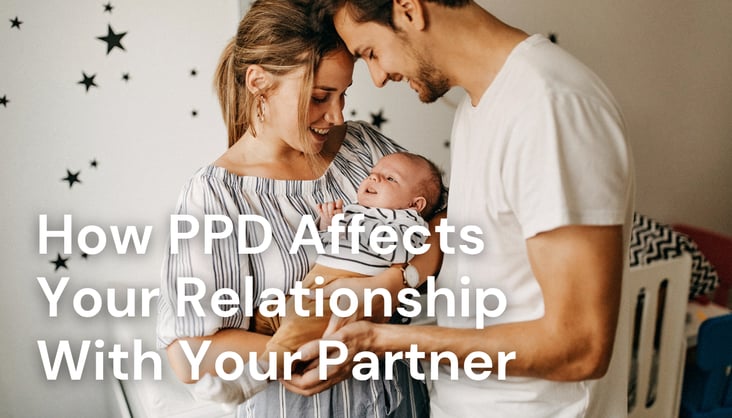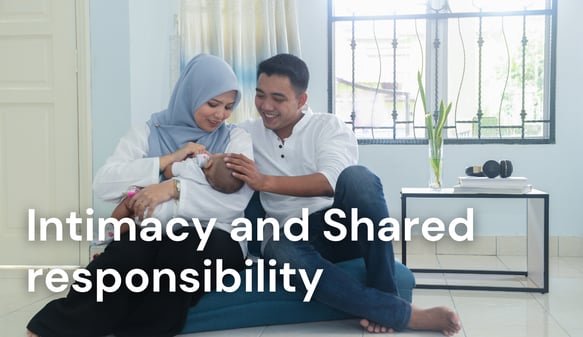How Postpartum Depression Affects Your Relationship With Your Partner
7/1/20254 min read


Bringing a new baby into the world is supposed to be a joyous time. But the emotional weight of new parenthood—especially when complicated by postpartum depression (PPD)—can place an enormous strain on even the healthiest relationships. Sleep-deprived nights, hormonal crashes, identity shifts, and communication breakdowns can quietly chip away at the closeness and connection between partners.
Many couples enter parenthood expecting challenges. What they don’t always anticipate is how PPD can transform those challenges into emotional disconnect, resentment, or confusion, particularly when one partner doesn’t fully understand what the other is going through.
At Peace Temple, we work with couples navigating the shadow PPD casts over their relationship. The truth is: postpartum depression doesn’t just affect one person—it touches the entire family system. And understanding this impact is the first step toward healing.
The Emotional Disconnect: When You No Longer Feel Seen
One of the most painful relationship effects of PPD is the emotional wall that can rise between partners. The person experiencing depression may feel:
Numb or emotionally unavailable
Overwhelmed by guilt or worthlessness
Disconnected from their identity
Insecure about being a “good parent” or partner
These internal struggles often drown out emotional intimacy. The affected partner may withdraw, stop initiating affection, or communicate less—leaving the other partner feeling ignored, rejected, or helpless.
On the flip side, the non-depressed partner may feel confused or even resentful:
“Why can’t they just talk to me?”
“What did I do wrong?”
“They used to be so affectionate—now I feel invisible.”
Without proper understanding, these thoughts spiral into miscommunication, judgment, and hurt.
At Peace Temple, we help couples unpack this dynamic so both partners can see the behaviour not as a personal rejection—but as a symptom of PPD that can be addressed together.
The Impact on Communication
PPD often brings with it:
Irritability or hypersensitivity
Withdrawal or “stonewalling”
Difficulty articulating needs
In the midst of depression, it may feel impossible to say, “I’m scared, I feel like I’m failing, I need help.” Instead, partners might snap, go quiet, or mask their pain behind routine.
The non-depressed partner may feel like they’re walking on eggshells—unsure whether to press, pull back, or pretend everything’s fine. Misunderstandings pile up, creating emotional distance just when closeness is needed most.
This is where open, structured dialogue with therapeutic guidance becomes invaluable. Peace Temple’s relationship-focused postpartum therapy helps partners communicate without blame, fostering safety in difficult conversations.
The Shifting Balance of Responsibilities
Parenting brings a massive reshuffle of household roles, and depression can unbalance that reshuffle. The partner with PPD may struggle to:
Maintain routines or household tasks
Keep up with feedings, appointments, or errands
Show up emotionally or physically for the baby or partner
The other partner may feel forced to pick up the slack—often without acknowledgment or reciprocity. Over time, this can lead to resentment, burnout, and emotional fatigue.
Statements like:
“I feel like I have two babies to care for.”
“I didn’t sign up for this alone.”
“Everything falls on me now.”
…may come from a place of frustration, but they often mask deeper feelings of powerlessness and grief over the partnership’s imbalance.
Through counselling at Peace Temple, we help both partners name these feelings and work toward redistributing responsibilities in a way that honours everyone’s emotional bandwidth.


The Loss (and Redefinition) of Intimacy
Intimacy often suffers under the weight of postpartum depression—not just physical intimacy, but emotional and relational closeness too.
The partner experiencing PPD may:
Have little to no libido
Feel emotionally disconnected from their own body
Avoid touch, conversation, or vulnerability
The other partner may feel confused, rejected, or undesired. They might not realize that their partner’s depression has hijacked their capacity for connection, not their love or attraction.
At Peace Temple, we remind couples that intimacy doesn’t start in the bedroom—it starts with emotional safety, attunement, and small acts of reconnection. Healing in this area often begins with shared presence, not pressure.
How PPD Can Affect the Non-Depressed Partner
It’s important to acknowledge that PPD doesn't just take a toll on the person diagnosed—it also affects their partner's mental health. Many partners feel:
Helpless watching their loved one suffer
Afraid to say the wrong thing
Overwhelmed by the pressure to “hold everything together”
Isolated, as if their own emotional needs no longer matter
These feelings are valid. And when they’re left unspoken, they often turn into:
Passive-aggressive communication
Emotional shutdown
Anxiety or depression in the partner
Peace Temple’s couples support model encourages both parents to express what they’re carrying—and to seek mutual support instead of collapsing under individual silence.
What Helps: Rebuilding Connection During PPD
1. Name the Impact Together
Sit down and openly acknowledge, “This is hard. It’s changed how we feel close. But we’re in this together.” Just that recognition can relieve pressure and foster solidarity.
2. Prioritize Emotional Check-Ins
Even five minutes a day to ask, “How are you feeling today—really?” can rebuild empathy. Keep it low-pressure, honest, and without problem-solving.
3. Share the Mental Load
Sometimes, “help” needs to be more proactive. Instead of asking “Do you need anything?” try, “I’ll handle the next two feedings so you can rest.” Emotional labour counts just as much as physical tasks.
4. Seek Therapy—Individually and Together
PPD is treatable. And couples counselling can prevent long-term relationship damage by helping both partners express needs, repair trust, and realign as a team.
Peace Temple’s integrated postpartum therapy programs offer both individual and relational support tailored to families in transition.
5. Celebrate Small Wins
Sometimes, intimacy is folding laundry together. Sometimes it’s watching a show without talking. Reconnecting doesn’t have to be grand—it just has to be intentional.
Final Thoughts: Love Can Survive This
PPD tests even the strongest relationships. It introduces fear, distance, and emotional exhaustion—but it also reveals the power of presence, patience, and partnership.
You may not feel close right now. You may argue more. You may grieve the couple you were before parenthood. That’s okay. This doesn’t mean you’re broken—it means you’re in transition.
At Peace Temple, we believe relationships can not only survive postpartum depression, but emerge more connected, conscious, and compassionate.
You’re not failing. You’re learning how to hold each other in new ways. And that, too, is love.
